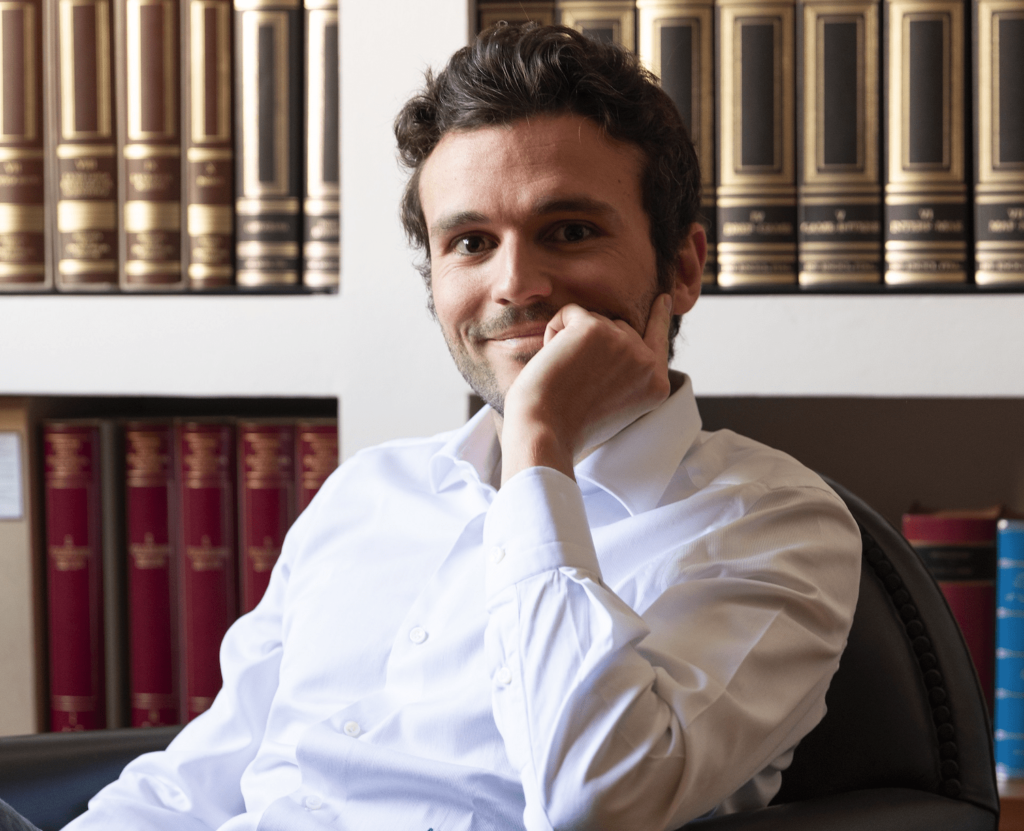
On Friday, April 28, Dr. Alessio Terzi ’08 returned to the College on the Hill to discuss his 2022 book, Growth for Good: Reshaping Capitalism to Save Humanity from Climate Catastrophe with the Political Economy Project. Prof. Doug Irwin introduced the illustrious Dr. Terzi, who earned his Master’s and PhD at the London School of Economics. He presently serves as an economist at the European Commission’s Directorate-General for Economic and Financial Affairs, is an Affiliate Fellow Bruegel, a Brussels-based think tank, and is a Fulbright Scholar at the Harvard Kennedy School. If that’s not an impressive CV, I don’t know what is! After attending a PEP-sponsored lunch with Dr. Terzi, I must also note that the scholar is as generous with his time, magnanimous, and good-natured as he is an accomplished economist.
Dr. Terzi kicked off his presentation by showing the audience packed into Rocky 001 photos from his time at Dartmouth. In a touching full-circle moment, Dr. Terzi displayed one photo of himself and classmates in Rocky 002 alongside Prof. Skinner in his course Econ 28: Public Economics. After taking us on a short trip down memory lane, Dr. Terzi dove into the substance of his lecture.
He began by specifying the genesis of his book: the pandemic and associated lockdowns. Dr. Terzi noted that some people found a silver lining during the early days of the pandemic along the lines of “Nature was healing.” As evidence, Dr. Terzi brought up the widely disseminated (and fake) photos of dolphins returning to Venice. Such posts raised the question as to whether governments should actively curtail the size of the economy to decrease C02 emissions. Dr. Terzi adamantly disagrees with such an approach.
On the next slide, Dr. Terzi presented the “(Un?-)holy trinity” of capitalism, growth, and nature alongside the following questions: “Is the economy like a bicycle? If you stop pedaling, do you fall over? Is capitalism inherently destructive of nature?” Dr. Terzi proceeded to answer these questions in turn. First, he argued that abolishing growth would be incompatible with capitalism and would necessitate complete societal restructuring. Dr. Terzi challenged those calling for degrowth to provide a blueprint for an alternative society.
Dr. Terzi specified one popular alternative: ecosocialism and the steady-state economy. Proponents thereof claim that consumers’ desire for more and better is artificially induced by capitalism. On this premise, they argue for abandoning market-driven growth and hyper-consumerism, with economic development becoming centrally planned and carried out by public investments in green technology. Dr. Terzi also explained how ecosocialists embrace self-sufficient (read: autarkic) eco-villages that produce everything their inhabitants require locally through direct democracy.
In Growth for Good, Dr. Terzi systematically debunks this false alternative. First, regarding growth and inequality, he argues that a steady-state environment exacerbates conflict within and between societies as consumers compete over a static basket of goods and services. Next, Dr. Terzi dispels the notion that “the system” compels otherwise indifferent people to desire more. Instead, Dr. Terzi reframes growth as an “imperative,” not an “imposition.” Finally, Dr. Terzi emphasizes that humanity’s desire to use technology and knowhow to shape the world is fundamental to our “self-determination” as a species. In a nod to Joseph Henrich, Dr. Terzi posits that “The Secret of our Success” is our ability to form groups, share knowledge, solve problems, and expand the real value we enjoy, instead of accepting the present endowment as immutable. In short, “We believe in taking our destiny into our own hands.”
Concluding his presentation, Dr. Terzi explained, as he writes in his book, that growth did not start with the Industrial Revolution; humans have always leveraged technology to achieve more of our wants and needs while managing our relationship with nature. The current growth model based on fossil fuels, Dr. Terzi claims, no longer satisfies this condition. Instead of pursuing degrowth, Dr. Terzi advances a different growth model: avoiding climate disaster by leveraging the innovative forces of capitalism for green R&D in order to transition the economy to an environmentally sustainable one. Not to be mistaken for a climate-change skeptic, Dr. Terzi emphasized that action must be taken by “avant-garde green transitioners,” pioneering businesses, and governments to reach carbon neutrality by 2050 in what he describes as a “whole-of-nation approach.”
The progrowth Green Industrial Revolution advanced by Dr. Terzi entails a “complete recasting of comparative advantages across the globe”: Some countries will emerge as winners, while others will remain stuck in outmoded technologies producing goods and services perceived as old and low quality. Anticipating opposition to the negative distribution effects of the transition, Dr. Terzi, referencing “Innovation and its Enemies” by Calestous Juma, emphasizes that “green policy and inclusive social policy must proceed hand-in-hand.”
In a self-deprecating quip, Dr. Terzi concluded that, “even if you are an amoral being … an economist,” you must take into account the dramatic social implications of the transition to a carbon-neutral model of economic growth. To his credit, I think that it was clear to all attendees that Dr. Terzi, though an economist, is a far cry from an “amoral being.”

Be the first to comment on "Review Reviews: Dr. Alessio Terzi Talks Pro-Green Economic Growth"